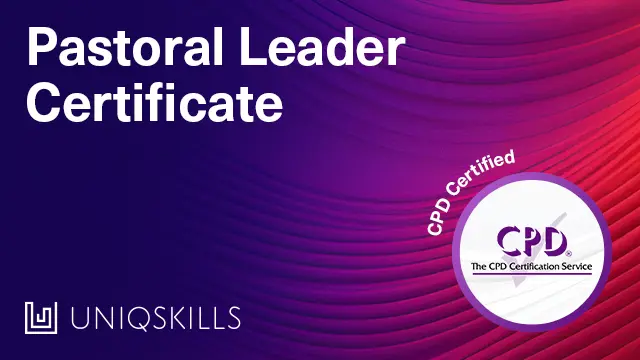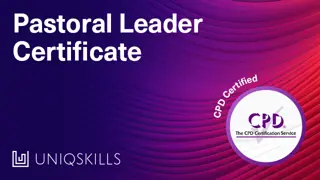
Pastoral Leader Online Certificate
CPD-Certified online program that equips you with the essential skills and knowledge to empower educators
UniqSkills
Summary
- Reed Courses Certificate of Completion - Free
Add to basket or enquire
Overview
This course is a comprehensive, insightful, instructor-guided course, designed to provide a detailed understanding of the nature of pastoral care in education, especially when it comes to dealing with bullying, cyberbullying, mental health issues, SEN, EAL, and more, to finding your key roles within it. This course will also help you explore leadership style and understand how to use it effectively in approaching difficult conversations with parents, students or staff members. The training materials from this course are available online for you to learn at your own pace.
CPD
Curriculum
-
Module 1: The Pastoral Role And Legal Elements 43:10
-
Module 2: The Pastoral Role And Education Regulations 45:54
-
Module 3: Mental Health – The Basics 37:18
-
Module 4: Supporting Mental Health Pastorally 58:41
-
Module 5: Bullying & Cyberbullying 36:50
-
Module 6: Engaging With The Parents And Families 35:46
-
Module 7: Supporting Sen Students Pastorally 36:51
-
Module 8: Disruptive Behaviours 32:32
-
Module 9: Working Strategically 22:40
-
Module 10: Supporting Your Mental Wellbeing 19:47
Course media
Description
By completing the course, participants will:
- Leverage Expert Mentorship: Benefit from the guidance of an ex SENCo experts with a proven track record in student well-being and mental health support.
- Access Real-World Insights: Tap into the practical knowledge gained from experienced experts in diverse educational settings, ensuring your learning is grounded in reality.
- Implement Actionable Strategies: Gain a toolkit of hands-on strategies that you can immediately apply in your role as a pastoral leader.
- Navigate Complex Scenarios: Learn to effectively address challenging situations, from nurturing mental health to addressing bullying and fostering parental collaboration.
- Foster a Nurturing Environment: Acquire techniques to create an environment where students feel emotionally supported, promoting holistic growth.
- Identify Early Signs: Develop the skills to recognise early signs of distress or mental health issues in students, enabling timely interventions.
- Empower Student Resilience: Equip students with the tools they need to cope with challenges, enhancing their emotional well-being.
- Collaborate with Parents: Learn effective communication strategies to engage parents and guardians in supporting student well-being.
- Navigate Legal Considerations: Understand legal frameworks and ethical responsibilities, ensuring you provide a safe and inclusive environment.
- Drive Systemic Change: Develop the expertise to advocate for institutional change that places student well-being at the forefront.
- Enhance Professional Standing: Earn a CPD-accredited qualification that elevates your credibility and expertise within the education sector.
- Lead with Confidence: Gain the confidence to make informed decisions and guide students toward positive outcomes.
- Apply Cognitive Behavioural Techniques: Incorporate evidence-based CBT techniques to support students' mental health effectively.
- Tailor Support for Diversity: Learn to address the unique needs of diverse student populations, promoting inclusivity.
- Promote Positive Engagement: Develop skills to engage parents, guardians, and students collaboratively, enhancing the overall educational experience.
- Become a Change Catalyst: Position yourself as a leader who drives positive change in your institution's well-being initiatives.
- Incorporate Proven Practices: Benefit from insights and methodologies that have been successful in a range of educational settings.
- Inspire Student Growth: Create an environment where students not only succeed academically but also flourish emotionally and mentally.
Who is this course for?
Embark on a transformative journey as an educator with our comprehensive 'Pastoral Leader Online Certificate' course. This program is designed to empower you to become a true advocate for student well-being, offering insights into creating a nurturing environment, addressing critical mental health challenges, and fostering a holistic educational experience. Led by seasoned educators and specialists, this course ensures you're equipped with practical strategies and knowledge. Plus, with CPD certificate, you're not just learning; you're elevating your professional journey with a recognised qualification.
Requirements
While there are no strict prerequisites, having some basic computer skills, English proficiency, and a genuine interest in the Education sector can enhance the learning experience. However, the course is intentionally designed to accommodate individuals with diverse backgrounds and levels of expertise, making it accessible to a wide audience.
Career path
The average pastoral leader salary in the United Kingdom is £26,000 per year or £13.33 per hour. Entry level positions start at £23,036 per year while most experienced workers make up to £31,884 per year.
Questions and answers
Currently there are no Q&As for this course. Be the first to ask a question.
Certificates
Reed Courses Certificate of Completion
Digital certificate - Included
Will be downloadable when all lectures have been completed.
Reviews
Currently there are no reviews for this course. Be the first to leave a review.
Legal information
This course is advertised on reed.co.uk by the Course Provider, whose terms and conditions apply. Purchases are made directly from the Course Provider, and as such, content and materials are supplied by the Course Provider directly. Reed is acting as agent and not reseller in relation to this course. Reed's only responsibility is to facilitate your payment for the course. It is your responsibility to review and agree to the Course Provider's terms and conditions and satisfy yourself as to the suitability of the course you intend to purchase. Reed will not have any responsibility for the content of the course and/or associated materials.


